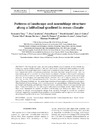Identificador persistente para citar o vincular este elemento:
https://accedacris.ulpgc.es/jspui/handle/10553/49585
| Título: | Patterns of landscape and assemblage structure along a latitudinal gradient in ocean climate | Autores/as: | Tuya, Fernando Cacabelos, Eva Duarte, Pedro Jacinto, David Castro, Joao J. Silva, Teresa Bertocci, Iacopo Franco, Joao N. Arenas, Francisco Coca, Josep Wernberg, Thomas |
Clasificación UNESCO: | 250501 Biogeografía 251005 Zoología marina 241705 Biología marina |
Palabras clave: | Latitude Macroecology Habitat structure Assemblage structure Kelps, et al. |
Fecha de publicación: | 2012 | Publicación seriada: | Marine Ecology - Progress Series | Resumen: | The Portuguese coast has overlapping distributions of species of both boreal and Lusitanian origins; a large number of cold- and warm-water species have their southern or northern distributional range edges here. A latitudinal gradient in ocean climate, particularly sea surface temperature (SST) and primary production, has been described along this coast. Here, we took advantage of this gradient in ocean climate to explore affinities in the biogenic landscape structure of subtidal shallow reefs (the abundance of habitat patches), as well as in the assemblage structure of macroalgae and associated fishes, between each of 3 regions: Viana do Castelo (41.5°N), Peniche (39.2°N) and Sines (37.8°N). Five reefs were sampled to determine the abundance of biogenic habitats and the assemblage structure of macroalgae and fishes in each region. The structure of the landscape, and of macroalgal and fish assemblages, differed between Viana do Castelo and Peniche and between Viana do Castelo and Sines, but not between Peniche and Sines. Viana do Castelo was the only region with conspicuous kelp forests, while Peniche and Sines were dominated by patches of foliose turf-forming and filamentous algae. Our study revealed an abrupt macroecological change from northern Portugal to central and southern Portugal, suggesting a possible biogeographical reconfiguration and recognition of a wider transitional area from the Atlantic into Mediterranean waters. | URI: | https://accedacris.ulpgc.es/handle/10553/49585 | ISSN: | 0171-8630 | DOI: | 10.3354/meps09941 | Fuente: | Marine Ecology Progress Series [ISSN 0171-8630], v. 466, p. 9-19 |
| Colección: | Artículos |
Citas SCOPUSTM
87
actualizado el 08-jun-2025
Citas de WEB OF SCIENCETM
Citations
90
actualizado el 01-feb-2026
Visitas
277
actualizado el 16-ene-2026
Descargas
154
actualizado el 16-ene-2026
Google ScholarTM
Verifica
Altmetric
Comparte
Exporta metadatos
Los elementos en ULPGC accedaCRIS están protegidos por derechos de autor con todos los derechos reservados, a menos que se indique lo contrario.
